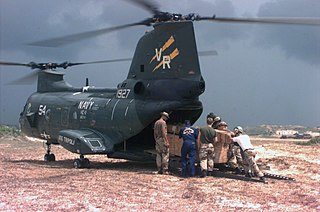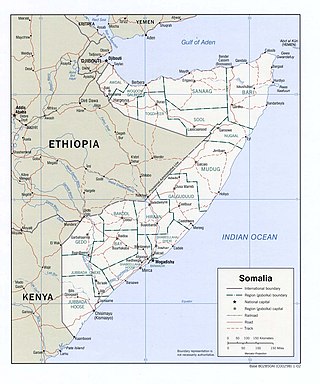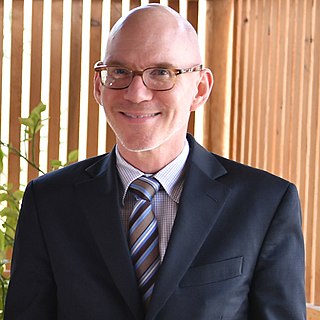
United Nations Security Council resolution 794, adopted unanimously on 3 December 1992, after reaffirming resolutions 733 (1992), 746 (1992), 751 (1992), 767 (1992) and 775 (1992), the Council "[expressed] grave alarm" regarding the situation in Somalia and authorised the creation of the Unified Task Force (UNITAF) to create a "secure environment for humanitarian relief operations in Somalia" in order to provide "essential for the survival of the civilian population". The current resolution determined that "the magnitude of human tragedy caused by the conflict in Somalia, further exacerbated by the obstacles being created to the distribution of humanitarian assistance [constitutes] a threat to international peace and security".

The Unified Task Force (UNITAF) was a United States-led, United Nations-sanctioned multinational force which operated in Somalia from 5 December 1992 until 4 May 1993. A United States initiative, UNITAF was charged with carrying out United Nations Security Council Resolution 794 to create a protected environment for conducting humanitarian operations in the southern half of the country.

United Nations Operation in Somalia I was the first part of a United Nations (UN) sponsored effort to provide, facilitate, and secure humanitarian relief in Somalia, as well as to monitor the first UN-brokered ceasefire of the Somali Civil War conflict in the early 1990s.
A special representative of the Secretary-General is a highly respected expert who has been appointed by the Secretary-General of the United Nations to represent them in meetings with heads of state on critical human rights issues. The representatives can carry out country visits to investigate alleged violations of human rights and act as negotiators on behalf of the United Nations.

The United Nations Department of Political and Peacebuilding Affairs (DPPA) is a department of the Secretariat of the United Nations (UN) with responsibility for monitoring and assessing global political developments and advising and assisting the UN Secretary General and his envoys in the peaceful prevention and resolution of conflict around the world. The department manages field-based political missions in Africa, Central Asia, and the Middle East, and has been increasing its professional capacities in conflict mediation and preventive diplomacy. DPPA also oversees UN electoral assistance to Member States of the organization. Established in 1992, the department's responsibilities also include providing secretariat support to the UN Security Council and two standing committees created by the General Assembly concerning the Rights of the Palestinian People and Decolonization. DPPA is based at the UN Headquarters in New York City.

The Ministry of Defence is charged with co-ordinating and supervising all agencies and functions of the government relating directly to national security and the Somali Armed Forces. The President of Somalia is the Supreme Commander of the Armed Forces of the country. The Ministry of Defence provides policy framework and resources to the Armed Forces to discharge their responsibility in the context of the defence of the country. The Armed Forces under the Defence Ministry are primarily responsible for ensuring the territorial integrity of the nation. The current Minister of Defence of Somalia is Abdulkadir Mohamed Nur.

United Nations Security Council resolution 865, adopted unanimously on 22 September 1993, after reaffirming resolutions 733 (1992), 746 (1992), 751 (1992), 767 (1992), 775 (1992), 794 (1992), 814 (1993) and 837 (1993), the Council addressed the process of national reconciliation and political settlement in Somalia, during the civil war.

United Nations Security Council resolution 885, adopted unanimously on 16 November 1993, after reaffirming resolutions 733 (1992), 746 (1992), 751 (1992), 767 (1992), 775 (1992), 794 (1992), 814 (1993), 837 (1993), 865 (1993) and 878 (1993) on Somalia and Resolution 868 (1993) on the safety of United Nations peacekeeping personnel, the council authorised the establishment of a Commission of Inquiry to investigate attacks on the United Nations Operation in Somalia II which led to casualties.

United Nations Security Council Resolution 1916, adopted unanimously on March 19, 2010, after recalling resolutions 733 (1992), 1519 (2003), 1558 (2004), 1587 (2004), 1630 (2005), 1676 (2006), 1724 (2006), 1744 (2007), 1766 (2007), 1772 (2007), 1801 (2008), 1811 (2008), 1844 (2008), 1853 (2008), 1862 (2009), 1894 (2009) and 1907 (2009), the Council extended the term of the Monitoring Group for 12 months and expanded its mandate to include the monitoring of the arms embargo on Eritrea in addition to Somalia.

United Nations Security Council Resolution 1964, adopted unanimously on December 22, 2010, after recalling previous resolutions on the situation in Somalia, the Council authorised the continuation of the mandate of the African Union Mission to Somalia (AMISOM) until September 30, 2011, and increased its size from 8,000 to 12,000 personnel.

United Nations Security Council Resolution 1744, adopted unanimously on 20 February 2007, authorizing the African Union mission replacing and subsuming the IGAD Peace Support Mission in Somalia or IGASOM, which was a proposed Intergovernmental Authority on Development protection and training mission to Somalia approved by the African Union on 14 September 2006. IGASOM was also approved by the United Nations Security Council on 6 December 2006.

United Nations Security Council Resolution 1801 was unanimously adopted on 20 February 2008.

United Nations Security Council Resolution 1872 was unanimously adopted on 26 May 2009.

United Nations Security Council Resolution 1831 was unanimously adopted on 19 August 2008.
Michael Keating is the executive director of the European Institute of Peace, an independent conflict resolution organisation based in Brussels, with activities in fifteen countries in Africa, the Middle East, Eastern Europe, Central Asia, and Latin America. He was the Special Representative of the Secretary-General for Somalia and Head of the United Nations Assistance Mission in Somalia (UNSOM), from January 2016 until September 2018.

United Nations Security Council Resolution 2093 was unanimously adopted on 6 March 2013.

James Christopher Swan is an American diplomat. He was the Special Representative of the United Nations Secretary-General for Somalia from May 2019 to October 2022.

The United Nations Regional Service Centre in Entebbe (RCSE) is a shared service centre based in Entebbe, Uganda that provides services, such as administrative, logistics and information and communications technology to various United Nations missions in Africa.

Anita Kiki Gbeho is a Ghanaian United Nations official who is the Deputy Special Representative in the United Nations Mission in South Sudan and Resident Coordinator in South Sudan since 8 December 2023.

The United Nations Assistance Mission in Somalia (UNSOM) was a special political mission of the United Nations Department of Political and Peacebuilding Affairs. Its primary purpose was to assist the Federal Government of Somalia in achieving peace, stability and reconciliation. It worked closely with and supported the work of the African Union Mission in Somalia (AMISOM) and the African Union Transition Mission in Somalia.












